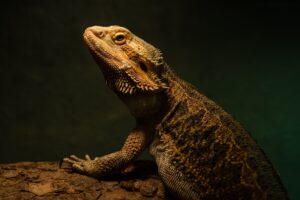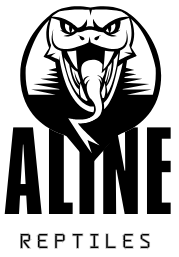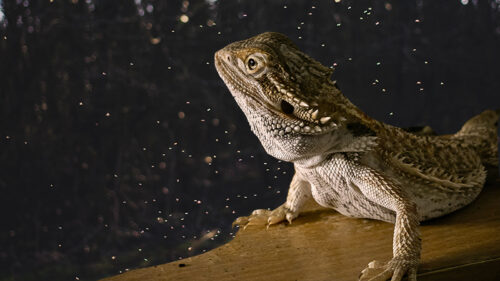Imagine you’ve just turned off the lights in your bearded dragon’s enclosure. It’s pitch dark, and you wonder: “can bearded dragons see in the dark” Or maybe you’ve noticed your scaly friend moving around at night and can’t help but ask yourself if they’re navigating through instinct or vision.
Bearded dragons are fascinating creatures with unique traits that make them excellent pets. One of the most intriguing questions that pet owners often have revolves around their vision—especially their ability to see in the dark.
In this article, we’ll explore how bearded dragon vision works, their behavior in darkness, and what you need to know to create a comfortable environment for them.
Understanding Bearded Dragon Vision

To understand whether bearded dragons can see in the dark, we first need to look at how their eyes work. Their vision is as unique as their personalities!
Anatomy of Bearded Dragon Eyes
Bearded dragons have well-adapted eyes for their environment. Here’s a quick breakdown of their eye structure and what makes their vision stand out:
| Feature | Details |
|---|---|
| Wide Field of View | Bearded dragons have eyes on the sides of their heads, giving them an almost 360° field of view. |
| Photoreceptors | Their eyes are packed with cones, making them highly sensitive to colors in bright light. |
| Third Eye (Parietal) | They have a parietal eye on their head that senses light and movement, aiding in predator detection. |
This eye structure makes them excellent at spotting food or detecting predators during the day. But what about their vision at night?
Daytime vs. Nighttime Vision
Bearded dragons are diurnal, which means they are active during the day and rest at night. Their eyes are optimized for daylight conditions, where they can see vibrant colors and detect movement with precision.
However, this specialization comes at a cost—they struggle in low light or complete darkness. Unlike nocturnal reptiles, bearded dragons lack the rod cells necessary for superior night vision.
Can Bearded Dragons See in the Dark?
Bearded dragons have very limited vision in the dark. While they can sense some light and shapes in dim conditions, they are not equipped to navigate in complete darkness.
How They Behave in the Dark
In darkness, bearded dragons rely more on instinct than vision. Their movements are slower, and they typically stay in one place, as their eyesight isn’t sharp enough to guide them.
- Dim Light: They can detect faint outlines or movements.
- Complete Darkness: Their vision is significantly impaired, making them almost “blind.”
If your bearded dragon appears active in the dark, it might be due to residual light in the room or other environmental factors.
Do Bearded Dragons Need Light at Night?
Now that you know their night vision is limited, the next question is: Should you provide light at night? Here’s what you need to know:
The Importance of Complete Darkness
Bearded dragons require complete darkness to rest properly. Just like humans, their sleep cycles (circadian rhythms) depend on distinct periods of light and dark. Exposure to light at night can disrupt their sleep, leading to stress and health issues over time.
Lighting Recommendations for Nighttime
Here’s a quick guide to nighttime lighting for your bearded dragon’s enclosure:
| Type of Light | Should You Use It at Night? | Reason |
|---|---|---|
| Ceramic Heat Emitters | Yes | Provides heat without light, ideal for maintaining nighttime temperatures. |
| UVB or Bright Lights | No | Can disrupt their sleep cycle and stress them out. |
| Red or Blue Night Lights | No | While marketed for reptiles, these can interfere with their natural sleep rhythms. |
Pro Tip: Use a ceramic heat emitter if you need to maintain warmth without affecting your dragon’s sleep.
Common Questions About Bearded Dragon Vision
1. Can Bearded Dragons See Colors?
Yes! Bearded dragons are excellent at seeing colors. In fact, their color vision is better than humans because they can detect a broader range of wavelengths, including UV light. This helps them spot food and predators in their natural environment.
2. Do Bearded Dragons Recognize Their Owners in the Dark?
Bearded dragons rely on sight to recognize familiar faces, but in the dark, they struggle. Instead, they may recognize you by scent or sound if they’ve bonded with you.
3. Why Does My Bearded Dragon Move Around at Night?
This could be due to discomfort, improper temperature, or residual light in their enclosure. Ensure the habitat is dark and maintains the right nighttime temperature (70–75°F).
How to Improve Your Bearded Dragon’s Habitat

Creating a habitat that mimics their natural environment is key to keeping your bearded dragon happy and healthy. Here are some tips:
1. Sleep-Friendly Environment
- Ensure the enclosure is completely dark at night.
- Use a ceramic heat emitter to maintain nighttime temperatures if needed.
- Avoid placing the enclosure in areas with ambient light, such as near a TV or bright window.
2. Safe Handling Practices in the Dark
If you must handle your bearded dragon at night:
- Use a dim flashlight or cover a bright light source to avoid startling them.
- Avoid sudden movements; remember, their vision is poor in the dark.
3. Temperature and Lighting Control
Maintaining the right temperature and lighting cycle is essential for their overall health. Here’s a summary:
| Time of Day | Light Type | Temperature Range |
|---|---|---|
| Daytime | UVB + Bright Light | 95–105°F in the basking area, 75–85°F in the cool zone. |
| Nighttime | No Light, Ceramic Heat | 70–75°F to mimic nighttime desert conditions. |
Fun Facts About Bearded Dragon Vision
Let’s end with some fun tidbits about their amazing eyesight:
- They have a “third eye.” This parietal eye helps them detect shadows and changes in light, acting as a survival tool.
- They can see UV light. This unique ability helps them spot food and recognize other dragons.
- Wide field of vision. Their eye placement gives them a panoramic view, perfect for spotting predators in the wild.
FAQs
Q1: Can I use red or blue lights at night for my bearded dragon?
A: No, red or blue lights can disrupt their sleep. Use ceramic heat emitters instead for nighttime heating.
Q2: Why is my bearded dragon restless at night?
A: This could be due to improper temperatures, lighting, or discomfort in their habitat.
Q3: Do bearded dragons need UVB light at night?
A: No, UVB is only necessary during the day to support their health.
Conclusion
To sum up, bearded dragons can sense light and shapes in dim conditions but are not equipped to see well in the dark. Providing a habitat that mimics their natural day-night cycle is crucial for their health and happiness.
As a responsible pet owner, ensuring proper lighting, maintaining a comfortable temperature, and respecting their need for darkness will make your bearded dragon thrive. And now that you know the answer to “Can bearded dragons see in the dark?” you’re one step closer to becoming the best dragon parent ever!

